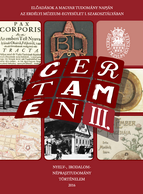Adatok az Erdélyi Református Egyházkerület első világháborús történetéhez
Data on the History of the Reformed Diocese of Transylvania from the World War I
Author(s): Lóránt LászlóSubject(s): Cultural history, History of Church(es), Social history, Pre-WW I & WW I (1900 -1919), Interwar Period (1920 - 1939)
Published by: Erdélyi Múzeum-Egyesület
Keywords: sermon literature; nationalism; frontline service; education; bells; refugee taking and return; Reformation; Reformed churches of Europe
Summary/Abstract: The outbreak of the First World War placed the Christian Churches of Europe into a delicate situation. They were forced to serve an ideology which was radically opposed to the doctrines of the New Testament. A new sermon literature emerged, which acknowledged and justified the War, and the Churches had to identify entirely with the objectives of the state, often becoming mere means of its propaganda. The Reformed Diocese of Transylvania represented no exception, its pastors were present on the battlefields and its theologians presented the war in their writings and sermons as a nation and soul renewing event. This changed radically as years passed. The Romanian invasion of 1916 and the evacuation of the South-East regions of Transylvania affected primarily the Hungarians. The majority of pastors, even while fleeing and being in their temporary accommodation area, strove to stay near their congregations. Disappointment, false enthusiasm, xenophobic discourse was equally present in the sermon literature of the last two years of the war. Stimulated by the situation created by the end of the war, the Hungarian churches of Transylvania made a tight confessional collaboration.
Journal: Certamen
- Issue Year: 2016
- Issue No: III
- Page Range: 313-327
- Page Count: 15
- Language: Hungarian

